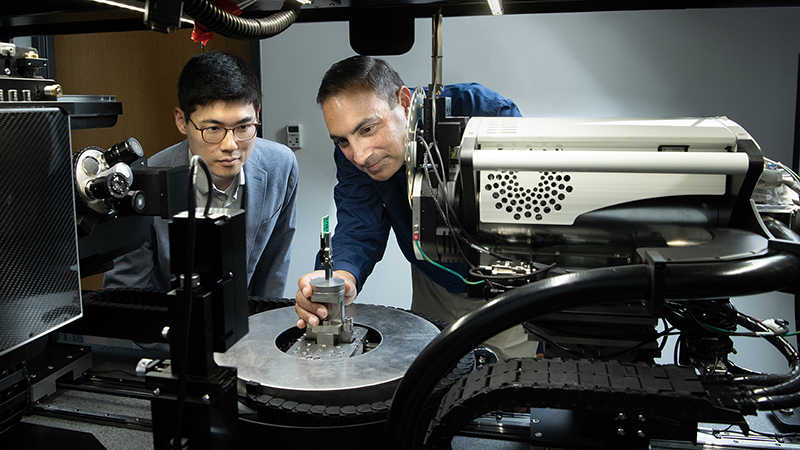Materials engineering is pivotal in shaping the technological landscape, driving advancements across diverse fields. In aerospace, using advanced composites like carbon-fibre-reinforced polymers has led to the creation of lighter, more fuel-efficient aircraft, contributing to reduced emissions and enhanced performance. In the medical field, titanium alloys have improved the durability and biocompatibility of implants, resulting in better patient outcomes. These advancements demonstrate the impact of materials engineering on technology and quality of life.
To contribute to these groundbreaking innovations, a strong academic foundation is essential — which can be found at Purdue University, ranked among the top 100 universities in the world (QS World University Rankings 2024). Home to the College of Engineering, which is just as highly ranked, it is #6 among engineering graduate programmes in the US (US News & World Report).
The School of Materials Engineering (MSE) is ranked among the top five largest MSE departments and is part of the College of Engineering, which is the largest of the top 10 engineering colleges in the US.
Here, aspiring professionals can pursue a Professional Master’s Programme (PMP) without a background in materials engineering. The PMP is designed to help students from non-materials STEM programmes enter or transition into the field of materials science. It enhances their skillsets, boosting their competitiveness in the job market. Additionally, it provides students with a materials background the opportunity to gain further experience in industry applications. They gain a robust technical foundation, mentorship, and professional development opportunities apt for those interested in regional, national, and international industrial sectors.

Purdue University offers a flexible course schedule, allowing students to select from various Materials Engineering courses and additional subjects to tailor their career path. Source: Purdue University
That is what led one of Materials Engineering graduates to pursue the PMP programme. “I’ve always dreamed of earning a degree from a prestigious university,” he says. “Purdue’s renowned faculty and strong industry connections were significant factors in my decision. The programme’s emphasis on practical, hands-on experience aligns perfectly with my career goals.”
Students can take up to 12 of the 30 required credits outside of MSE, focusing on business, leadership, communication, or entrepreneurship. This broad approach ensures graduates are well-rounded and prepared for the complexities of the modern industrial landscape.
The core curriculum includes 18 credits of MSE courses, with nine credits tailored to the student’s specific interests, such as materials processing, characterisation, or computational materials. This tailored approach enables students to gain deep insights into sustainable materials solutions for a cleaner future. PMP graduates leave equipped to contribute immediately to industries seeking advancements in material creation, eco-friendly manufacturing, and the application of materials science across various sectors, from semiconductors to batteries and construction.
Unlike traditional research-based master’s degrees, the PMP allows students to design their own academic path and timeline. “We have a flexible course schedule that students can choose from various courses in Materials Engineering and across campus to enhance their chosen career path,” says David Bahr, Blacutt-Underwood Head of Materials Engineering.

Some students engage in directed research projects that align with their interests, including industry-based projects that provide practical experience in applying their knowledge. Source: Purdue University
This flexibility means students can tailor their coursework to align with specific career goals, drawing from various materials engineering and interdisciplinary options. What’s more, internships are highly encouraged, and the curriculum includes courses such as project management, marketing, and business — valuable assets in the industry typically absent from research-based MS programmes. “We have several companies who come seeking interns and are willing to meet with students and discuss opportunities with the potential of getting interviews for positions,” Bahr says.
“PMP students have had internships at some of the largest manufacturers in the world; Purdue’s ties to industry open doors in the state and around the world.”
At the heart of the programme is a world-class faculty engaged in cutting-edge research across various materials domains bringing their expertise to the classroom. From machine learning and biomaterials to semiconductors and metals, students have access to a rich academic environment that mirrors the diversity of the materials industry. The programme’s core philosophy is simple: materials are essential to every industry. As such, the curriculum is structured to provide students with a solid foundation and the ability to specialise based on their interests.
For example, one of the PMP students progressed through the programme, his career aspirations became more focused on the energy industry. He wanted to work and conduct research in the field of battery technology — and he did just that. “During my time at Purdue, I had the opportunity to delve deeply into this area, which significantly enhanced my knowledge and skills.”
To keep pace with emerging technologies and industry trends, the programme integrates innovative teaching methods and continuously updates its course offerings. New courses are regularly reviewed and introduced to address the latest advancements in materials research. Professional Development sessions feature experts from various fields who provide insights and answer students’ questions about different career paths.
The diverse career opportunities available to PMP graduates are a significant advantage of the programme. Unlike some engineering specialisations that may limit career options, MSE graduates are highly adaptable and sought after across various sectors. Their expertise and readiness make them valuable assets in multiple industries.
No wonder current students love their time at the university. “I would highly recommend Purdue’s Professional Master’s Programme in Materials Engineering to other international students,” says one of the PMP gradautes. The programme offers a supportive and inclusive environment that helps international students thrive academically and socially. Additionally, students who appreciate a collaborative and diverse learning environment will feel right at home at Purdue.”
Follow Purdue University School of Materials Engineering on Facebook and LinkedIn













